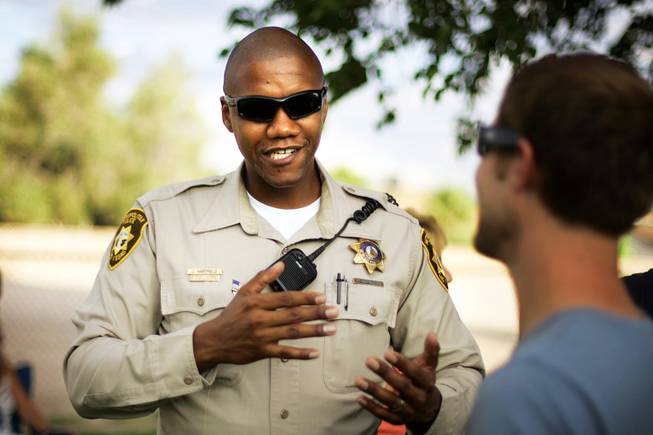
Metro Officer Charleston Hartfield is shown at community event at Molasky Family Park in Las Vegas, Aug. 2, 2011. Hartfield was killed when a gunman opened fire at a country music festival in Las Vegas on Oct. 1, 2017.
Wednesday, March 18, 2015 | 2 a.m.
Metro Police has rolled out a replacement for its troublesome $42 million police radio system, long accused by department officials of having unreliable service.
At a press show-and-tell Tuesday, Sheriff Joe Lombardo called the new $26 million network "flawless," noting that employees haven't had any complaints since it was installed in December.
The previous system, meanwhile, was often blamed for dropped calls and spotty reception since it was installed four years ago. Officials say it went dead during at least two officer-involved shootings, leaving officers alone to confront suspects.
Here's what you should know about the two radio systems:
The old system
Metro transitioned from an old analog system to a digital system in 2011 offered by the Florida-based telecommunications provider Harris Corp.
After two years, Sheriff Doug Gillespie told the service provider he'd planned to drop the service, dubbed "DesertSky." The sheriff's decision came amid the agency's post-recession budget crisis.
At Tuesday's press conference, radio systems director Michael A. Barnbeck said the agency was regularly struggling with "breakage, interference and garbled audio" with the old gear.
Lombardo had stronger words: "It was putting officers in danger in life-or-death situations."
Gillespie has said poor radio communication led to the shooting of unarmed veteran Stanley Gibson, who was shot and killed when an officer didn't hear commands instructing him not to shoot.
The system was also blamed for leaving an officer with a dead radio in June during a police chase and shootout. That incident prompted officers to double up in the event of a radio blackout.
Metro has since filed a lawsuit against Harris Corp. in an effort to recoup the money it spent on the failed system.
The new system
Metro officials began rolling out the new system in December, starting at a southwest substation.
They lauded service provider Motorola at Tuesday's event for installing the new system six months ahead of schedule.
Metro has purchased 5,500 radios and plans to convert another 800 to the new system. (It had about that many under the old system.)
Other law enforcement agencies will be able to tap into the new system to communicate with Metro.
Officials said they don't yet know what will happen to the old equipment.
"We signed on full-acceptance with Motorola and haven't looked back," Lombardo said. "In my random tromps throughout the police department ... each and every (officer) says it works flawlessly."

Join the Discussion:
Check this out for a full explanation of our conversion to the LiveFyre commenting system and instructions on how to sign up for an account.
Full comments policy